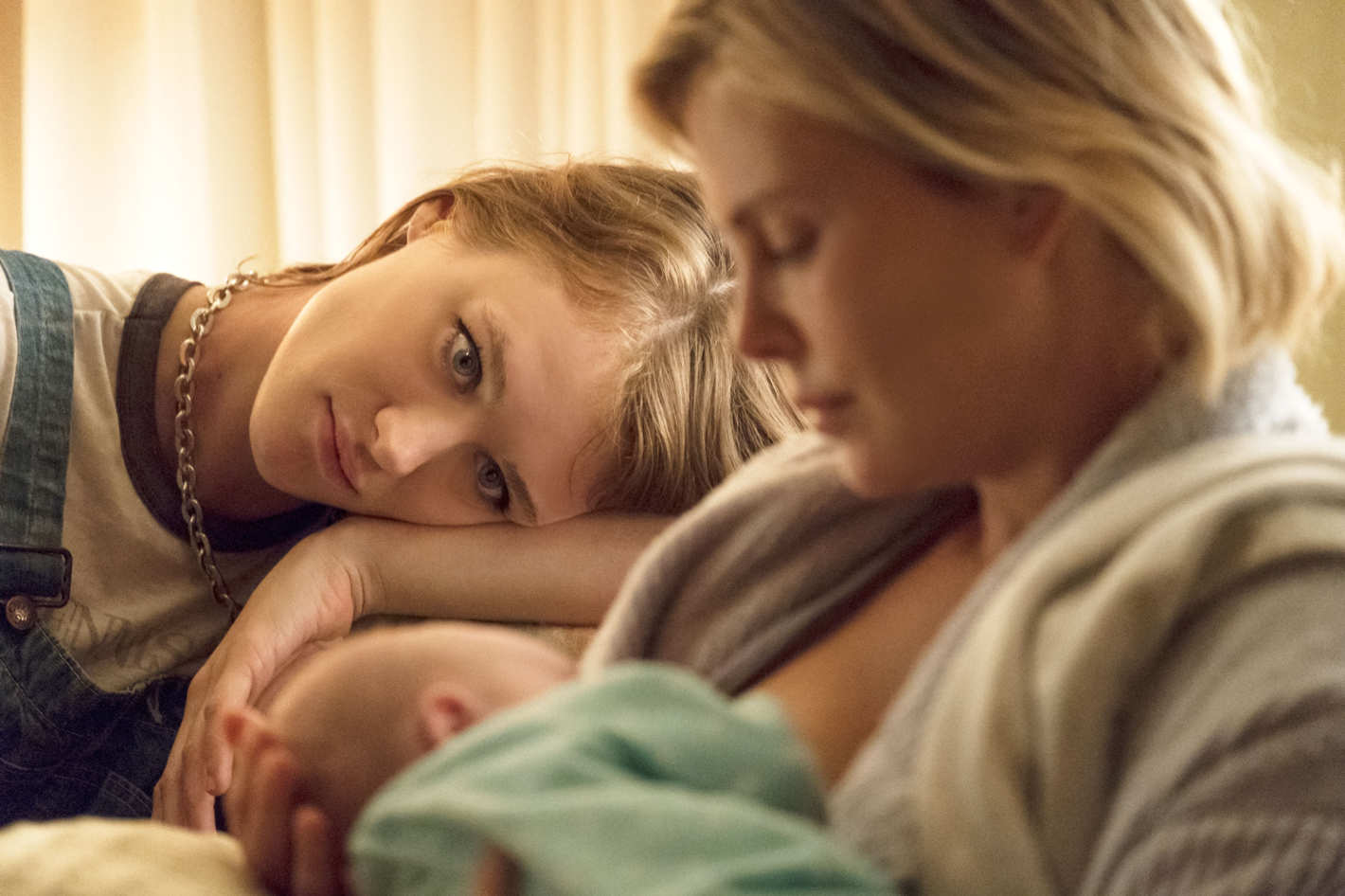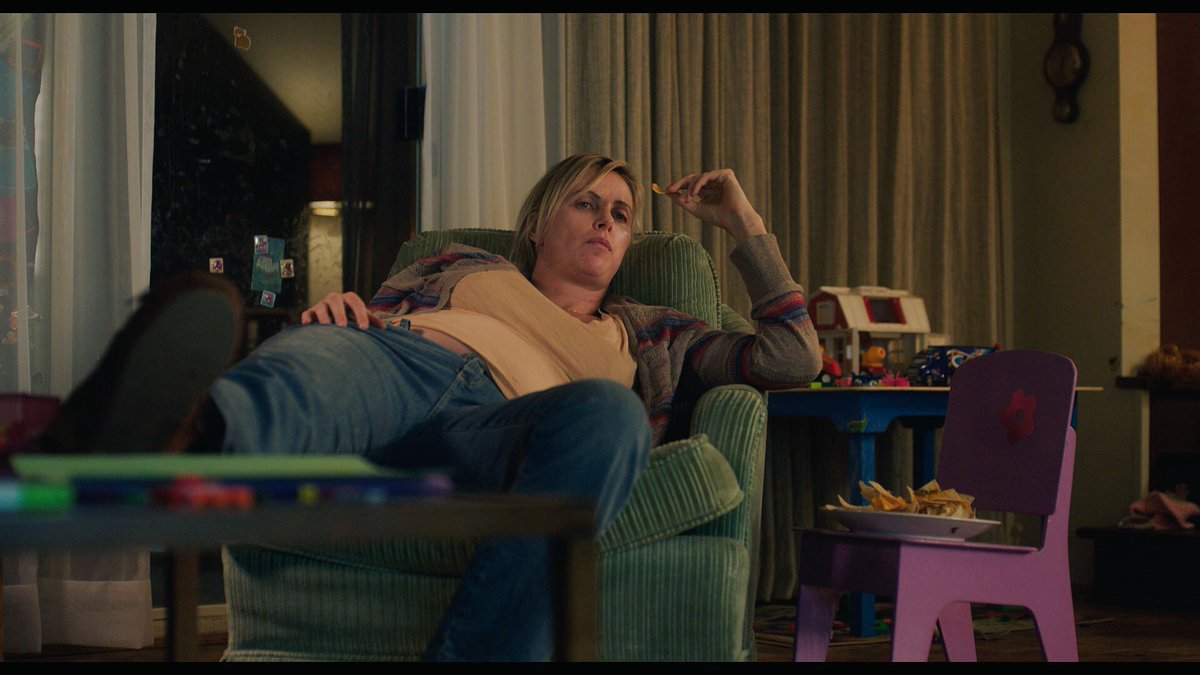Tully Review (Film, 2018)
I'm not afraid to take a strong stance on the issues that really matter in the world. I do not shy away from controversy. I have expressed my feelings on this subject before and I am not afraid to reiterate it.
Diablo Cody is arguably the best working screenwriter of our time and one of the all time greats.
Tully movie poser featuring Marlo covered in children's stickers.
Forget about the affected too cool for life hipster dialogue of Juno. True, I went to school with many people who spoke like that in NYC shortly before the film's release, so it was a clear authentic voice of young people for me, but it's not the genius of the film. Cody does dramatic structure better than anyone else working in film right now. Her work on Young Adult, United States of Tara, One Mississippi, and even Jennifer's Body (up there in the "just because a clear female perspective in horror makes you uncomfortable doesn't mean the horror film is bad club" with the 2013 Carrie remake and The Love Witch) prove her versatility in genre and tone as well as her command of dramatic structure. All the flashy editing, effects, and design in the world cannot make up for a screenplay that lacks balance or purpose in its form.
Tully is the film that could finally convince the world of this if people would watch it. This is the second time that Diablo Cody, director Jason Reitman, and star Charlize Theron have teamed up to produce a brilliant piece of cinema. While I personally prefer the tone and subject matter of Young Adult, I cannot deny the quiet power and heartbreaking beauty of Tully.
Marlo, an overworked mother of two children with a third on the way, is convinced to hire a night nurse. Her husband, Drew, is a great help, but his job requires a lot of traveling and Marlo has to manage on her own. Her oldest daughter is reaching an age where she's starting to be more self-conscious about her life versus the other children's lives in her private school (far more expensive than Marlo and Drew can realistically afford). Her only son is clinically described as atypical but bright, viewed as a burden by the school and an equal source of joy and frustration for the family. Marlo toughs out the first few days after the birth of the baby on her own, but eventually has no choice but to bring in a night nurse.
Tully, the night nurse, watches on as Marlo breastfeeds her newborn child.
That night nurse is Tully and she's nothing like Marlo expected. She's young and brilliant. She is filled with boundless energy and seems to know everything you could ever imagine. Tully is also just as concerned for the well-being of Marlo as she is for the baby, making it a point to clean the house or bake cupcakes for classroom snacks so Marlo has less to worry about during the day. Marlo and Tully develop a close bond as Marlo begins to value herself again.
Full disclosure: I'm actually sitting here with tears rolling down my face again writing this very basic plot summary. There are things that happen in this film that you need to experience on your own so you get the full impact of what Tully does so well. There's a brilliant twist ending. I, unfortunately, was spoiled numerous times before seeing the film and I still found the whole thing effective. That's why narrative structure is so important. A well-told story will still be impactful even if you know everything that's going to happen.
Tully makes me so emotional because it is the rare film that does not sugarcoat or romanticize genuine problems with mental health and well being. Obviously, as a cisgender man, I have not and will never be pregnant. I can't pretend to understand what that process does to the mental state of a pregnant person or truly grasp postpartum depression or anxiety. I can only relate from having experienced those incredible lows of clinical depression that makes you feel like you, as a person, have no value.
This is where the narrative starts in Tully. Marlo acts as a shell who lives only for her family. She is performative in her everyday actions. A disastrous meeting with the school's principal about accommodations for her son is treated with the mask of "everything is fine and you're right" that I frankly know all too well. Her honest reactions to genuine problems in her life are excused by the people around her as just a joke when she's serious (just at me next time, Cody). If she shows her true personality, she's a joke at best and a burden at worst; if she hides her true personality, she's a wonderful, understanding, empathetic person people want to be around.
The “funny” Katy Perry interview where she discusses performative aspects of depression, choosing to mask any problems because other people just won’t care or understand.
I have never seen a film so accurately address how fundamentally ill-equipped people are to actually deal with the reality of mental health problems. My Cthulhu, one of the biggest memes in recent memory is using Katy Perry's interview about her struggles with depression as a sad-sack punchline to minor inconveniences in life because how could someone as successful as Katy Perry actually have real emotions and problems?
The amount of times I've been told just to suck it up or how "x" will magically fix anything wrong with me is insulting. I did not come up with this metaphor, but it's incredibly apt. You would never tell someone with a broken leg that their problems aren't real. You would never tell that person that they should just try yoga or look on the bright side. You would never dismiss someone with a broken leg as a lost cause who just doesn't want to get better because they can't instantly heal themselves and start walking. Why do we, as a society, pretend that a little minor change or suggestion will cure something genuinely wrong with how the brain functions?
Marlo sits in a chair, surrounded by children's toys, while eating nachos in a rare moment of quiet at the house. (Seriously, Cody, just at me next time. This scene was way too real and common in my life: terrible food choices, mindless eating, and awful reality TV.)
Tully tackles this head on. The reason Marlo does not immediately sign up for a night nurse is this effect. Her brother, who offers to pay for the whole thing, acts like a night nurse will magically change Marlo's life. They're great. They make everything better. He doesn't actually care enough to help Marlo himself or try to have an honest discussion with her; he just wants her problems to all disappear. He wants his old sister back. A night nurse made his wife's life easier, so why wouldn't it work wonders for Marlo?
Marlo is not weak. She is strong. She knows she has a responsibility to her children to give them a good life. It's why she, herself, wants to be the one to bring the new baby through the first few weeks of life as her primary caretaker. Anything less than that is failure in the performative aspects of proving to the world that she has worth. The only person she can't prove that to is herself, and no one in her immediate life understands that.
It is textbook dramatic irony that the night nurse is the one to help Marlo out of this empty state. Marlo and her baby are the only people who regularly interact with Tully. Drew plays video games before going to bed. The older children are already asleep when the night nurse arrives. Marlo's brother isn't at the house to know when the night nurse started working there and the staff at the school have bigger concerns than any change in Marlo's behavior. Marlo shares the most intimate moments of her life with another woman whose only job is to support her and get her into a healthy routine to care for herself and her family.
Marlo does everything she can for the benefit of her children, even getting her face painted with her son at a birthday party.
This is another area that Diablo Cody excels at. She crafts these beautiful and honest characters who have mental health problems. Tully does for depression what Young Adult did for obsessive compulsive disorder. These screenplays humanize people dealing with serious mental health problems in a way we just don't see onscreen. Sure, plenty of films play around with depression or anxiety as a character trait. They'll shout out "he's depressed" or "she's anxious" and leave the character there. Cody refuses to dismiss these characters and their value as human beings, with distinct personalities and histories and lives, even when the characters themselves question their worth because of these conditions. It's masterful writing.
I could go on. We haven't even dug into what this film has to say about education, the development of children, gender roles in society, parenting philosophy, or economic status and power.
Tully is a beautifully nuanced drama that should be seen. Like Young Adult, it is not an easy film to watch because it deals with all these serious issues in a way that is unavoidable in the narrative structure of the film. It is a rewarding film, filled with unexpected moments and incredibly realistic characters. Tully is a film worth celebrating.
Tully is currently available for purchase in digital and physical formats.
Like what you're reading? Consider supporting Sketchy Details today.









